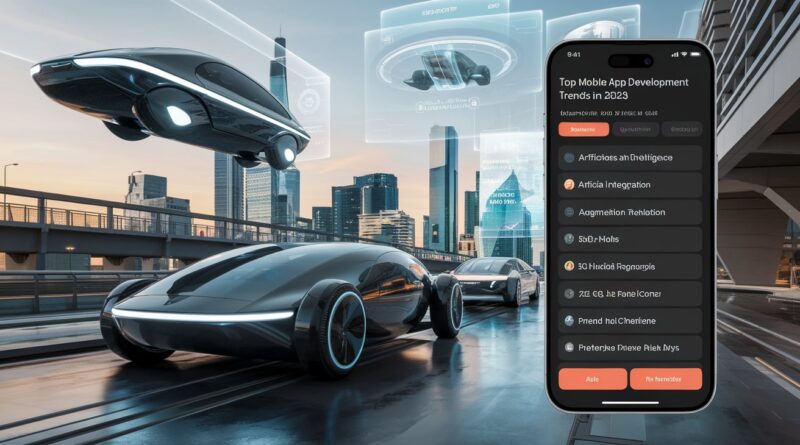What are the Top Mobile App Development Trends in 2025?
Mobile apps have become an integral part of daily life, shaping how we interact with businesses, access services, and engage with entertainment. As technology continues to evolve, so do mobile apps. In 2025, the mobile app development landscape will be shaped by new trends that cater to changing user needs, enhance user experiences, and push the boundaries of what’s possible with smartphones and tablets. In this article, we will explore the top mobile app development trends in 2025, offering insight into what businesses and developers can expect in the coming year.
1. Artificial Intelligence and Machine Learning Integration
Artificial Intelligence (AI) and Machine Learning (ML) are already making waves in the world of mobile app development, but by 2025, their presence will be more profound. AI and ML enable apps to analyze user behavior, provide personalized experiences, improve app functionality, and enhance customer support through features like chatbots and voice assistants.
Key Applications of AI/ML in Apps:
- Personalized recommendations and content
- Advanced image and voice recognition
- Chatbots and virtual assistants
- Predictive analytics for better user engagement
As businesses adopt AI-powered mobile app development services, users will experience smarter, more efficient apps that learn and adapt to their behaviors over time, offering a seamless experience.
2. 5G Connectivity and Enhanced Mobile App Performance
With 5G networks becoming more widespread, mobile apps in 2025 will leverage faster, more reliable connectivity to deliver high-speed performance and real-time functionality. This means smoother video streaming, faster downloads, and improved user experiences for gaming, augmented reality (AR), and virtual reality (VR) apps.
Impact of 5G on Mobile Apps:
- Reduced latency and faster data transfer
- Enhanced real-time communication (e.g., video calls, streaming)
- Better performance for high-bandwidth apps (AR/VR, gaming)
- Improved IoT connectivity for smarter apps
5G will revolutionize how mobile apps function, pushing the boundaries of what’s possible in terms of speed and performance.
3. Augmented Reality (AR) and Virtual Reality (VR)
Augmented Reality (AR) and Virtual Reality (VR) are two of the most exciting trends in mobile app development, and by 2025, these technologies will be more integrated into everyday applications. AR apps superimpose digital elements over the real world, while VR immerses users in entirely virtual environments. From gaming to shopping and healthcare, AR and VR will become mainstream in various industries.
Applications of AR/VR in Mobile Apps:
- AR-based shopping experiences (e.g., virtual try-ons)
- VR gaming and immersive entertainment
- Virtual real estate tours and educational experiences
- AR-powered navigation and location-based services
AR and VR will redefine user experiences in mobile apps, particularly in sectors like retail, gaming, healthcare, and education.
4. Cross-Platform Mobile App Development
The demand for apps that run seamlessly across different operating systems (iOS, Android) and devices is growing. In 2025, cross-platform mobile app development will be even more prevalent, thanks to advancements in frameworks like Flutter app development company, React Native, and Xamarin. These frameworks allow developers to write code once and deploy it on both iOS and Android, saving time and resources.
Benefits of Cross-Platform Development:
- Reduced development time and costs
- Single codebase for multiple platforms
- Faster updates and maintenance
- Wider audience reach
Businesses will continue to embrace cross-platform development to reach a broader audience while ensuring consistency in app performance and design.
5. Blockchain Technology for Mobile Apps
Blockchain technology is no longer confined to cryptocurrencies. By 2025, blockchain integration will be a significant trend in mobile app development, particularly for apps that require secure data handling, transparency, and decentralized features. Blockchain provides a secure way to manage transactions, protect user data, and eliminate fraud.
Applications of Blockchain in Mobile Apps:
- Secure payment systems and wallets
- Digital identity management
- Supply chain tracking
- Decentralized apps (dApps)
Incorporating blockchain into mobile apps will enhance security, transparency, and trust, making it an essential trend for industries such as finance, healthcare, and supply chain management.
6. Cloud-Based Mobile Apps
Cloud computing has transformed mobile app development, allowing apps to store data and run processes in the cloud rather than relying on local storage. This trend will continue to grow in 2025, as cloud-based mobile apps enable users to access data and services from anywhere, at any time, on any device.
Benefits of Cloud-Based Mobile Apps:
- Increased storage and processing capabilities
- Real-time data synchronization across devices
- Cost-effective scalability
- Enhanced security and data backup
Cloud-based apps will remain a key trend, enabling businesses to scale more efficiently and offer seamless experiences across multiple platforms.
7. Internet of Things (IoT) Integration
The Internet of Things (IoT) refers to the network of interconnected devices that can communicate with each other. In 2025, mobile apps will increasingly integrate with IoT devices, providing users with better control over their smart homes, cars, wearables, and other connected devices. From health apps to home automation, IoT integration will become a standard feature of mobile applications.
IoT-Based Mobile App Features:
- Smart home control (lighting, thermostats, security systems)
- Wearable device integration (health monitoring, fitness tracking)
- Connected vehicle apps (remote vehicle control, diagnostics)
- Industrial IoT (smart factories, predictive maintenance)
The growing adoption of IoT will drive the need for mobile apps that can manage, monitor, and control various connected devices seamlessly.
8. Privacy and Data Security Focus
As data privacy concerns continue to rise, mobile app development will increasingly focus on user privacy and security. In 2025, expect mobile apps to implement stronger encryption techniques, multi-factor authentication, and other security features to protect user data and ensure compliance with data protection regulations like GDPR.
Privacy-Enhancing Features in Mobile Apps:
- End-to-end encryption
- Biometric authentication (fingerprint, facial recognition)
- Transparent data usage policies
- Compliance with data protection regulations (GDPR, CCPA)
Users are becoming more conscious of how their data is handled, and businesses must prioritize security to maintain trust and avoid legal issues.
9. No-Code and Low-Code Development
The demand for no-code and low-code app development platforms is on the rise. These platforms allow individuals with little or no coding experience to build mobile apps quickly and easily. In 2025, the no-code/low-code trend will continue to empower businesses to create custom apps without relying on specialized development skills.
Benefits of No-Code/Low-Code Development:
- Faster app development
- Lower development costs
- Easier customization and iteration
- Democratization of app development
No-code and low-code platforms will help businesses rapidly deploy apps, reducing the barriers to entry for app development.
10. Mobile App Monetization Models
As mobile apps become essential for businesses, finding the right monetization strategy will be critical. In 2025, app developers will explore various monetization models, including in-app purchases, subscription services, ads, and freemium offerings, to generate revenue while ensuring a positive user experience.
Popular Monetization Models:
- In-app purchases and microtransactions
- Subscription-based models
- Freemium apps with premium features
- Advertising and affiliate marketing
The right monetization model will depend on the type of app and its target audience, but these models will remain at the forefront of mobile app development trends in 2025.
Conclusion
As we move into 2025, mobile app development will continue to be influenced by technological advancements and changing user expectations. From AI and 5G to IoT integration and blockchain, these trends will reshape how apps are built, used, and monetized. Businesses should stay informed about these mobile app development trends and leverage the latest technologies to create innovative, user-friendly apps that stand out in a competitive market.
Partnering with an experienced mobile app development services provider can help businesses navigate these trends and build apps that meet the needs of the modern user.




